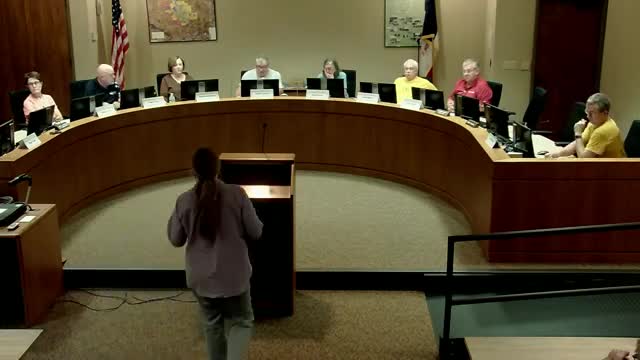Planning commission forwards Kaiser Corson crematorium addition to Board of Adjustment after contentious public hearing
October 03, 2025 | City of Waverly, Eaton County, Michigan
This article was created by AI summarizing key points discussed. AI makes mistakes, so for full details and context, please refer to the video of the full meeting. Please report any errors so we can fix them. Report an error »

The City of Waverly Planning and Zoning Commission voted to forward a special provisional use request for a building addition and crematory at 218 Second Street Southeast (Kaiser Corson Funeral Home) to the Board of Adjustment after a lengthy public hearing that drew residents, the applicant's attorney and a crematory manufacturer.
Kaiser Corson representatives, including attorney Natalie Riese and co‑owner/funeral director Ryan Tucker, said the installation would allow the funeral home to perform cremations on site, improve continuity of care for families and reduce costs associated with transporting remains to off‑site facilities. Riese cited Section 100.10.02 of the Waverly City Code (purpose of zoning ordinances) in arguing the application promotes convenience and general welfare if the installation complies with applicable emission standards.
Tom Kroll of Cremation Systems (manufacturer) gave technical testimony on equipment design, modern emission controls and industry testing methods. He referenced Method 9 visible emissions testing and said current units are engineered to limit particulate emissions well below the Iowa Department of Natural Resources threshold of 0.1 grain per dry standard cubic foot. Company and applicant documents shown at the hearing included an emissions report for the proposed unit; a co‑owner of Kaiser Corson said the unit has test results of about 0.0098 (below the state maximum) and that the business is working on the DNR permit process.
Residents—many of whom live on First Street Southeast or in nearby apartments—raised concerns about potential health effects from long‑term, low‑level emissions; the visibility of dark smoke; the effect on home values and whether the site is the appropriate location in or adjacent to a residential area. Multiple speakers asked about odor, monitoring and who enforces emissions standards. Several residents urged locating a crematory outside a residential neighborhood, or turning the site into green space or a play area for neighborhood children.
Commissioners asked technical follow‑ups about emissions testing, audible noise from combustion‑air equipment (one manufacturer representative estimated ~65 decibels at the intake point, with rapid drop‑off at distance), operator training and inspection frequency; witnesses said operators receive training, NFPA and industry standards apply, and equipment receives annual inspection and commissioning at installation. Commissioners also discussed design options to reduce noise and to place combustion‑air intakes to minimize neighborhood impact.
After discussion, the commission voted to forward the special provisional use request to the Board of Adjustment. The transcript records a roll‑call vote with the commissioners present recording a majority in favor; the Board of Adjustment will consider the applicants' permit and any conditions of approval.
No permit decision was made at the meeting; the Board of Adjustment hearing and any state permitting process will determine final operational approvals and monitoring requirements. The applicant indicated it is pursuing required state permits and will continue to provide technical data to staff and neighbors.
Kaiser Corson representatives, including attorney Natalie Riese and co‑owner/funeral director Ryan Tucker, said the installation would allow the funeral home to perform cremations on site, improve continuity of care for families and reduce costs associated with transporting remains to off‑site facilities. Riese cited Section 100.10.02 of the Waverly City Code (purpose of zoning ordinances) in arguing the application promotes convenience and general welfare if the installation complies with applicable emission standards.
Tom Kroll of Cremation Systems (manufacturer) gave technical testimony on equipment design, modern emission controls and industry testing methods. He referenced Method 9 visible emissions testing and said current units are engineered to limit particulate emissions well below the Iowa Department of Natural Resources threshold of 0.1 grain per dry standard cubic foot. Company and applicant documents shown at the hearing included an emissions report for the proposed unit; a co‑owner of Kaiser Corson said the unit has test results of about 0.0098 (below the state maximum) and that the business is working on the DNR permit process.
Residents—many of whom live on First Street Southeast or in nearby apartments—raised concerns about potential health effects from long‑term, low‑level emissions; the visibility of dark smoke; the effect on home values and whether the site is the appropriate location in or adjacent to a residential area. Multiple speakers asked about odor, monitoring and who enforces emissions standards. Several residents urged locating a crematory outside a residential neighborhood, or turning the site into green space or a play area for neighborhood children.
Commissioners asked technical follow‑ups about emissions testing, audible noise from combustion‑air equipment (one manufacturer representative estimated ~65 decibels at the intake point, with rapid drop‑off at distance), operator training and inspection frequency; witnesses said operators receive training, NFPA and industry standards apply, and equipment receives annual inspection and commissioning at installation. Commissioners also discussed design options to reduce noise and to place combustion‑air intakes to minimize neighborhood impact.
After discussion, the commission voted to forward the special provisional use request to the Board of Adjustment. The transcript records a roll‑call vote with the commissioners present recording a majority in favor; the Board of Adjustment will consider the applicants' permit and any conditions of approval.
No permit decision was made at the meeting; the Board of Adjustment hearing and any state permitting process will determine final operational approvals and monitoring requirements. The applicant indicated it is pursuing required state permits and will continue to provide technical data to staff and neighbors.
View full meeting
This article is based on a recent meeting—watch the full video and explore the complete transcript for deeper insights into the discussion.
View full meeting
